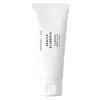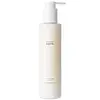What's inside
What's inside
 Key Ingredients
Key Ingredients

 Benefits
Benefits

 Concerns
Concerns

 Ingredients Side-by-side
Ingredients Side-by-side

Water
Skin ConditioningGlycerin
HumectantSodium Cocoyl Isethionate
CleansingCoco-Betaine
CleansingStearyl Alcohol
EmollientGlyceryl Stearate
EmollientSodium Methyl Cocoyl Taurate
CleansingSodium Chloride
MaskingMoringa Oleifera Seed Oil
EmollientAscorbyl Glucoside
AntioxidantAscorbic Acid
AntioxidantTremella Fuciformis Extract
HumectantOryza Sativa Extract
AbsorbentSaccharide Isomerate
HumectantSodium Hyaluronate
HumectantHyaluronic Acid
HumectantAdenosine
Skin ConditioningCurcuma Longa Root Extract
MaskingQuillaja Saponaria Bark Extract
CleansingMelia Azadirachta Flower Extract
Skin ConditioningMelia Azadirachta Leaf Extract
Skin ConditioningOcimum Sanctum Leaf Extract
Skin ConditioningCorallina Officinalis Extract
Skin ConditioningNiacinamide
SmoothingBetaine
HumectantTrehalose
HumectantMannitol
HumectantCitric Acid
BufferingKaolin
AbrasiveCoco-Glucoside
CleansingMicrocrystalline Cellulose
AbsorbentCeramide NP
Skin ConditioningHydrogenated Lecithin
EmulsifyingGlycine
BufferingSerine
MaskingGlutamic Acid
HumectantPhytosphingosine
Skin ConditioningAspartic Acid
MaskingLeucine
Skin ConditioningAlanine
MaskingLysine
Skin ConditioningArginine
MaskingTyrosine
MaskingPhenylalanine
MaskingProline
Skin ConditioningThreonine
Valine
MaskingIsoleucine
Skin ConditioningHistidine
HumectantCysteine
AntioxidantMethionine
Skin ConditioningDiamond Powder
Abrasive1,2-Hexanediol
Skin ConditioningSodium Phytate
Sodium Citrate
BufferingZea Mays Starch
AbsorbentHydroxypropyl Starch Phosphate
Butylene Glycol
HumectantCaprylyl Glycol
EmollientCitrus Aurantium Bergamia Fruit Oil
MaskingRosmarinus Officinalis Leaf Oil
MaskingPinus Sylvestris Leaf Oil
MaskingLavandula Angustifolia Oil
MaskingWater, Glycerin, Sodium Cocoyl Isethionate, Coco-Betaine, Stearyl Alcohol, Glyceryl Stearate, Sodium Methyl Cocoyl Taurate, Sodium Chloride, Moringa Oleifera Seed Oil, Ascorbyl Glucoside, Ascorbic Acid, Tremella Fuciformis Extract, Oryza Sativa Extract, Saccharide Isomerate, Sodium Hyaluronate, Hyaluronic Acid, Adenosine, Curcuma Longa Root Extract, Quillaja Saponaria Bark Extract, Melia Azadirachta Flower Extract, Melia Azadirachta Leaf Extract, Ocimum Sanctum Leaf Extract, Corallina Officinalis Extract, Niacinamide, Betaine, Trehalose, Mannitol, Citric Acid, Kaolin, Coco-Glucoside, Microcrystalline Cellulose, Ceramide NP, Hydrogenated Lecithin, Glycine, Serine, Glutamic Acid, Phytosphingosine, Aspartic Acid, Leucine, Alanine, Lysine, Arginine, Tyrosine, Phenylalanine, Proline, Threonine, Valine, Isoleucine, Histidine, Cysteine, Methionine, Diamond Powder, 1,2-Hexanediol, Sodium Phytate, Sodium Citrate, Zea Mays Starch, Hydroxypropyl Starch Phosphate, Butylene Glycol, Caprylyl Glycol, Citrus Aurantium Bergamia Fruit Oil, Rosmarinus Officinalis Leaf Oil, Pinus Sylvestris Leaf Oil, Lavandula Angustifolia Oil
Citrus Junos Peel Water 62.6%
Skin ConditioningMacadamia Ternifolia Seed Oil
EmollientWater
Skin ConditioningLauryl Glucoside
CleansingGlycerin
HumectantIsoamyl Laurate
EmollientCetearyl Alcohol
EmollientHydrogenated Vegetable Oil
EmollientCetearyl Olivate
Polyglyceryl-10 Oleate
Skin ConditioningGlyceryl Stearate Citrate
EmollientSorbitan Olivate
EmulsifyingAloe Barbadensis Leaf Extract
EmollientBioflavonoids
Skin ConditioningBrassica Oleracea Italica Extract
AstringentPropanediol
SolventAllantoin
Skin ConditioningTocopherol
AntioxidantScutellaria Baicalensis Root Extract
AstringentUlmus Davidiana Root Extract
Skin ConditioningGlycyrrhiza Glabra Root Extract
BleachingXanthan Gum
EmulsifyingCitric Acid
BufferingArginine
MaskingP-Anisic Acid
MaskingCitrus Junos Peel Water 62.6%, Macadamia Ternifolia Seed Oil, Water, Lauryl Glucoside, Glycerin, Isoamyl Laurate, Cetearyl Alcohol, Hydrogenated Vegetable Oil, Cetearyl Olivate, Polyglyceryl-10 Oleate, Glyceryl Stearate Citrate, Sorbitan Olivate, Aloe Barbadensis Leaf Extract, Bioflavonoids, Brassica Oleracea Italica Extract, Propanediol, Allantoin, Tocopherol, Scutellaria Baicalensis Root Extract, Ulmus Davidiana Root Extract, Glycyrrhiza Glabra Root Extract, Xanthan Gum, Citric Acid, Arginine, P-Anisic Acid
 Reviews
Reviews

Ingredients Explained
These ingredients are found in both products.
Ingredients higher up in an ingredient list are typically present in a larger amount.
Arginine is an amino acid that is important for human development. Your body uses is it to produce hair keratin and skin collagen.
As a cosmetic ingredient, Arginine has antioxidant properties and can also help repair damaged skin. This ingredient is derived either synthetically or from animals.
Arginine isn't fungal acne safe when used in the presence of other lipids (fats, fatty acids, oils, esters, etc). Oils and fats occur naturally within the skin, so take caution when using Arginine if you're prone to fungal acne.
Learn more about ArginineCitric Acid is an alpha hydroxy acid (AHA) naturally found in citrus fruits like oranges, lemons, and limes.
Like other AHAs, citric acid can exfoliate skin by breaking down the bonds that hold dead skin cells together. This helps reveal smoother and brighter skin underneath.
However, this exfoliating effect only happens at high concentrations (20%) which can be hard to find in cosmetic products.
Due to this, citric acid is usually included in small amounts as a pH adjuster. This helps keep products slightly more acidic and compatible with skin's natural pH.
In skincare formulas, citric acid can:
While it can provide some skin benefits, research shows lactic acid and glycolic acid are generally more effective and less irritating exfoliants.
Most citric acid used in skincare today is made by fermenting sugars (usually from molasses). This synthetic version is identical to the natural citrus form but easier to stabilize and use in formulations.
Read more about some other popular AHA's here:
Learn more about Citric AcidGlycerin is already naturally found in your skin. It helps moisturize and protect your skin.
A study from 2016 found glycerin to be more effective as a humectant than AHAs and hyaluronic acid.
As a humectant, it helps the skin stay hydrated by pulling moisture to your skin. The low molecular weight of glycerin allows it to pull moisture into the deeper layers of your skin.
Hydrated skin improves your skin barrier; Your skin barrier helps protect against irritants and bacteria.
Glycerin has also been found to have antimicrobial and antiviral properties. Due to these properties, glycerin is often used in wound and burn treatments.
In cosmetics, glycerin is usually derived from plants such as soybean or palm. However, it can also be sourced from animals, such as tallow or animal fat.
This ingredient is organic, colorless, odorless, and non-toxic.
Glycerin is the name for this ingredient in American English. British English uses Glycerol/Glycerine.
Learn more about GlycerinWater. It's the most common cosmetic ingredient of all. You'll usually see it at the top of ingredient lists, meaning that it makes up the largest part of the product.
So why is it so popular? Water most often acts as a solvent - this means that it helps dissolve other ingredients into the formulation.
You'll also recognize water as that liquid we all need to stay alive. If you see this, drink a glass of water. Stay hydrated!
Learn more about Water